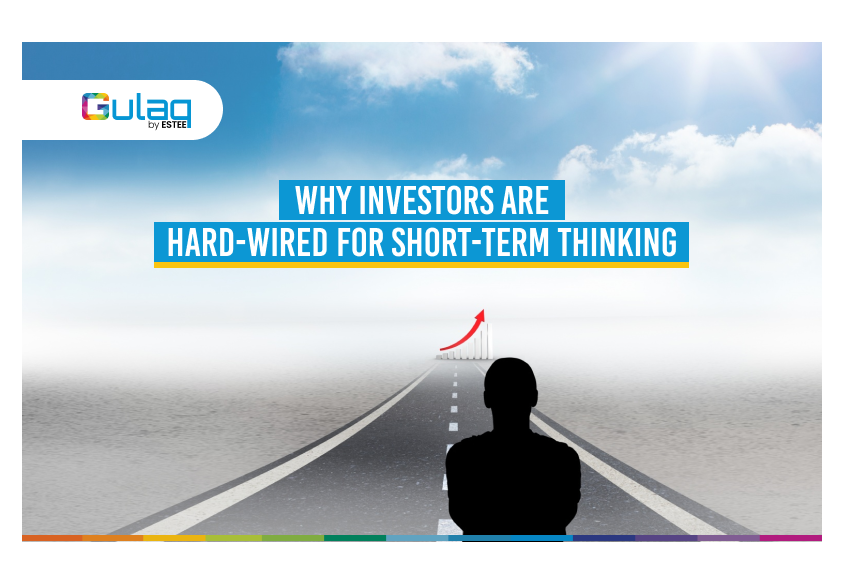
Why Investors Are Hard-Wired for Short-Term Thinking
An analysis done by Reuters revealed that an average investor holds shares for a mere 5.5 months before selling them for an uncountable number of reasons.
The analysis also revealed that the average holding period has been trending shorter and shorter. In the 1950s for instance a typical investor would hold onto a stock for about 8 years on average. Today it's less than half a year.
Investor’s obsession with short-term performance often hurts the long-term potential of the company as it forces the management to make short-term decisions that please the investors but are detrimental over the long run.
And it's not just the investors who are to blame. A study done by Harvard Business Review found out that it's actually the senior management of the companies that is often too obsessed with releasing good quarterly numbers.
This is because their incentive structure is designed such that their compensation is tightly tied to the stock price and they fear that their jobs might be threatened if the stock performs poorly.
Companies that have historically failed to meet the analyst's quarterly expectations have often been punished severely by the market.
The fear of facing repercussions from the market forces the management to prioritize short-term performance. This in turn attracts investors who are fixated on the quarterly numbers which again puts pressure on the management to live up to these expectations completing a vicious cycle of short-term behavior.
Dangers of Short-Termism
There has been a lot of research done on the consequences of short-termism and all concludes that it's a value destroyer.
Investors who obsess over short-term performance rarely make successful investors. They tend to overanalyze every little dance move that the market performs and are generally more likely to succumb to emotional biases.
Management that prioritizes short-term performance often cuts back on discretionary spending to meet analyst expectations. The bulk of discretionary spending involves R&D expenditure and capex which is vital for building long-term success.
Additionally short-term-oriented management also tends to do more frequent stock buybacks to support the share price starving themselves of cash that otherwise could have been put towards profitable projects.
Why are we Hard-Wired to Short-Term Behaviour?
It turns out our species in general is hard-wired to short-term thinking. For hundreds and thousands of years we used to live in the wildlife as hunter-gatherers. Our ancestors didn't know when and where their next meal was going to come from. In times like that surviving the next day was more important than surviving the next month.
Our brains evolved to prioritize short-term needs over long-term ones. Satisfying them created instant gratification and a sense of pleasure that our brains desired. So don't beat yourself too much if you find yourself constantly seeking instant gratification. After all this is what has ensured the survival of our species. Just kidding!
While we no longer face any such dangers that once our ancestors faced all those traits that helped us survive for so long don't just magically disappear.
Unfortunately in financial markets such behavior can become a barrier that prevents you from creating wealth and might even destroy what has already been created. Fighting your natural instinct and thinking long-term becomes essential ingredient for success in the market.
How to Avoid Short-Term Thinking:
-
Diversification:
When investing always prioritize diversification. With proper diversification across different asset classes and sectors you can reduce the impact of short-term market volatility on your portfolio. A loss in one stock or sector would be offset by a gain in another smoothing the return curve and reducing the likelihood of you responding to these short-term fluctuations.
-
Goal-Oriented Investing:
Establishing clear investment goals and timelines can shift your focus from short-term market movements to long-term objectives. By aligning your investments with specific financial goals you are less likely to be swayed by short-term emotions.
-
Periodic Reviews:
A lot of investors check their vitals monthly but portfolios daily. Instead of obsessing over daily market movements you can benefit from periodic portfolio reviews. Assessing your investments on a scheduled basis allows for a more rational and objective evaluation of performance minimizing the itch to interfere as a result of short-term fluctuations.
Bottom Line
The world is filled with people too focused on watching their next steps instead of focusing on the direction they are moving. Those who can avoid the quick rich temptations and instead focus on building long-term sustainable wealth are at a serious advantage over those who can't.
Related Posts
Is Market Cap the Best Way to Build an Index?
Nifty 50 is a free-float weighted index – a slight variation of market cap weighted…
3 Books That Changed How I Think About Risk and Markets
Over the past two decades, I’ve built a quiet but consistent habit — reading. Not…
All Nifty Bees Are Equal — But Some Are More Equal Than Others
The title, inspired by George Orwell’s classic Animal Farm, perfectly captures the essence of this…
Investing with Confidence by Prioritizing Fundamentals in Volatile Markets
Investing in the stock market is a roller-coaster ride. Recent global trade tensions, heavy outflows…








